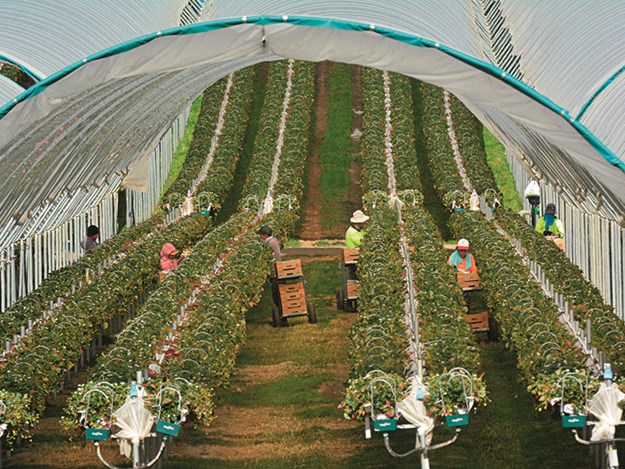Piecework among fruit and vegetable pickers will change radically in late April after the new Horticulture Award takes effect
Australian farm workers will be guaranteed an hourly minimum pay rate from April 28 this year after the Fair Work Commission (FWC) formalised a decision to change the Horticulture Award.
First proposed by the FWC last November, the changes to the Horticulture Award will guarantee farm workers such as fruit pickers are entitled to take home the minimum casual rate of pay, currently $25.41 per hour.
This pay rate comprises the national minimum wage – which is currently $20.33 per hour – plus a 25 per cent casual loading to apply to casual workers only. Employers will still be able to pay their workers a piecework rate after the changes to the Award take effect on April 28 this year.
However, that rate must be set at a level “which enables a pieceworker competent at the piecework task to earn at least 15 per cent more per hour than the hourly rate for the pieceworker”.
 |
|
Farm workers will be entitled to a set rate of pay from April 28
|
Under the award, a “pieceworker competent at the piecework task” is a pieceworker who has at least 76 hours of experience in performing the task.
The changes to the award also state that pieceworkers must not be paid less than the amount they would have received had they been paid the hourly rate for each hour worked.
In its decision, the FWC concluded that this rate must be calculated by employers daily, saying “a significant proportion of pieceworkers are engaged for one day or less”.
It concluded the move would protect employees and reduce regulatory burdens for employers, who are also required to record the hours worked by pieceworkers and the rate applied to hours completed.
Under the Award as it currently stands, horticulture enterprises can pay workers under a piece rate scheme – that is, pickers are paid in accordance with the quantity of fruit picked or vegetables harvested.
However, in bringing its case for the changes to the FWC, the Australian Workers’ Union (AWU) said there have been multiple reports of businesses paying workers inadequate sums for their labour.
AWU national secretary Daniel Walton says the FWC decision is a win for horticulture workers.
“It’s fantastic that from April 28 fruit pickers will get some certainty about how much they should be legally paid for their labour — the union is counting the days,” Walton says.
“For too long the farmers’ lobby has seen fruit pickers as somehow beneath the usual standards offered to Australian workers. But the hard work of pickers deserves the same minimum wage dignity afforded to everyone else.”
Walton also said he was grateful the FWC had accepted the AWU’s argument that the hourly rate earnings must be calculated daily.
“One of the great advantages of last year’s historic ruling was the clarity it provided. Fruit pickers — who often have limited English and information about Australian laws – will now find it easy to assess if they are being ripped off by their employer,” he says.
“This ruling is a huge advance for this industry and for all the farmers who are already doing the right thing.”
Those opposed to the minimum hourly rate for horticulture workers suggested its introduction would negatively impact productivity and would see the most productive workers leave the industry, as they would not be paid as much as under the previous piece rate scheme.
Such claims of productivity discouragement were made by eight industry groups including Citrus Australia, which argued that the minimum floor price ‘‘impacts the incentivisation of inexperienced pieceworkers to improve quickly and to become productive”.
However, in its decision, the FWC dismissed the claims as “speculative and unsupported by any evidence”, adding that underperformance could be managed by setting proficiency targets.
The FWC noted its preliminary decision in November 2021, where it stated: “We accept that appropriately set pieceworker rates can provide an incentive for workers to increase their output, as their earnings will increase.
“We are not persuaded that introducing a minimum wage floor will ‘disincentivise’ piece- workers currently earning more than the minimum award rate. It seems to us that such an outcome is inherently unlikely.”
Nothing in the submissions received after the initial November decision had persuaded the FWC to depart from that conclusion, it added.

